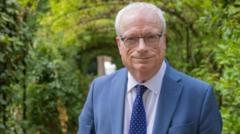Who is the New Chancellor of Cambridge University?

Lord Chris Smith Elected Chancellor of the University of Cambridge
The recent election of Lord Chris Smith as the next chancellor of the University of Cambridge marks a significant moment in the institution's history. This ceremonial role, which has been held by notable figures in the past, now welcomes a leader with a rich background in public service and a commitment to higher education. His election follows a competitive process involving ten candidates, reflecting a diverse range of perspectives and experiences. With his extensive history in various leadership roles, Lord Smith aims to be a strong advocate for both the university and the broader educational landscape.
Lord Smith's election signifies a new chapter for the University of Cambridge. As the master of Pembroke College since 2015, his familiarity with the institution positions him well to take on the responsibilities of chancellor. His excitement about the role is palpable; he stated, "To be elected as chancellor of the university I love is a huge honour. I'm thrilled." This enthusiasm not only reflects his personal commitment but also sets the tone for his tenure, which is expected to last for ten years.
The Election Process
The election of Lord Smith was notable for its inclusive approach, incorporating online voting for the first time. Approximately 23,000 alumni and staff participated, indicating a vibrant community engagement in the decision-making process. The election featured a diverse slate of candidates, including well-known personalities such as anti-Brexit campaigner Gina Miller and broadcaster Sandi Toksvig. This competitive environment underscores the significance of the chancellor's role and the high level of interest from the university community.
Role and Responsibilities of the Chancellor
The chancellor's role at the University of Cambridge is primarily ceremonial, yet it holds considerable importance within the university's ecosystem. The chancellor serves as an ambassador for the institution, advocating for its strategic interests and supporting fundraising initiatives. While the position involves no executive responsibilities, the chancellor acts as a sounding board for senior university figures, providing guidance and support. This dual role of ambassador and advisor is crucial in navigating the challenges and opportunities that higher education faces today.
Lord Smith's Background and Vision
Lord Chris Smith's career spans various sectors, equipping him with a unique perspective on the challenges facing higher education today. He served as the Secretary of State for Culture, Media, and Sport under the Labour government from 1997 to 2001, where he championed cultural and educational initiatives. Additionally, his tenure as chairman of the Environment Agency and the Advertising Standards Authority showcases his leadership in both environmental and regulatory matters. This broad experience positions him to advocate effectively for the university's aims.
Diversity and Inclusion Commitment
Throughout his career, Lord Smith has demonstrated a commitment to diversity and inclusion. He notably identifies as the "first openly gay Cabinet Minister anywhere in the world," highlighting his role as a pioneer in breaking barriers within government and public service. His focus on diversity will likely inform his approach as chancellor, promoting an inclusive environment at the University of Cambridge that reflects the values of its diverse student body and faculty. This commitment to representation is essential in today's educational landscape, where diversity enhances creativity and innovation.
Words from the University Leadership
Following Lord Smith’s election, Prof Deborah Prentice, the University of Cambridge vice-chancellor, expressed her congratulations and optimism about their collaboration. She stated, "I very much look forward to working with him and building on the strong relationship that we have developed since I became vice-chancellor." This sentiment reflects a shared vision for the future of the university, with both leaders aiming to strengthen Cambridge’s position as a leading institution in higher education.
Looking Ahead: Challenges and Opportunities
As Lord Smith steps into his role, he faces a landscape of challenges and opportunities. The ongoing impact of the global pandemic on higher education, the necessity for adaptation to new teaching methods, and the pressing need for funding and resource allocation are just a few of the issues he will need to navigate. Moreover, the landscape of higher education is evolving rapidly, with increasing competition and the demand for innovation in curriculum delivery and research. His experience will be invaluable as he advocates for Cambridge's strategic interests and responds to these challenges.
Engaging with Alumni and the Community
One of Lord Smith's primary responsibilities will be to engage with the university’s vast alumni network. With alumni spanning the globe, fostering these connections will be crucial for fundraising efforts and community building. His previous roles have provided him with a strong foundation in public relations and outreach, skills that will aid him in strengthening ties with alumni and promoting the university's goals. By creating a more engaged and connected alumni community, Lord Smith can help enhance the university's reputation and resources.
The Importance of Advocacy in Higher Education
In today’s climate, advocacy for higher education has never been more vital. Lord Smith has highlighted his intention to be a "strong voice for higher education more generally." As he steps into this role, he will need to navigate the complexities of public policy, funding, and societal expectations surrounding education. Advocacy efforts will be essential in ensuring that universities like Cambridge can continue to thrive and adapt to the changing world.
Conclusion
The election of Lord Chris Smith as the chancellor of the University of Cambridge is a momentous occasion, marking the beginning of a new era. His extensive experience and commitment to diversity and advocacy position him well to navigate the challenges ahead. As he embarks on this journey, the university community is eager to see how he will shape the future of Cambridge. With a focus on engagement, innovation, and community building, Lord Smith's tenure promises to be impactful. What will this new leadership mean for the future of higher education in general, and how will it influence the direction of the University of Cambridge specifically?
Frequently Asked Questions
Who is Lord Chris Smith?
Lord Chris Smith is the newly elected chancellor of the University of Cambridge and has previously served as Secretary of State for Culture, Media, and Sport. He has a long history of advocacy in the fields of culture, media, and education.
What are the responsibilities of the chancellor at the University of Cambridge?
The chancellor serves primarily as a ceremonial figure, acting as an ambassador for the university, supporting fundraising efforts, and providing guidance to senior university figures. They advocate for the university's strategic interests while having no executive responsibilities.
How was Lord Smith elected as chancellor?
Lord Smith was elected through a voting process that included online votes for the first time, with about 23,000 alumni and staff participating. His election followed a competitive slate of ten candidates.
What is Lord Smith's vision for the University of Cambridge?
Lord Smith aims to be a strong advocate for higher education and intends to foster connections with alumni while promoting diversity and inclusion within the university community.
As the landscape of higher education continues to evolve, what do you believe are the most pressing issues that new leaders like Lord Chris Smith should address? #HigherEducation #UniversityofCambridge #Leadership
Published: 2025-07-24 08:45:04 | Category: technology



